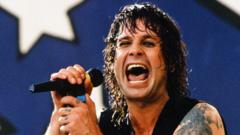Pope Francis’ upcoming funeral is set for Saturday, marking a significant moment for the Catholic Church as the pontiff's legacy of humility and simplicity comes to the forefront. Mourners across the globe pay tribute as the Vatican prepares for a less ornate ceremony compared to traditional papal funerals.
Pope Francis' Funeral Sets Tone of Simplicity Amid Global Mourning

Pope Francis' Funeral Sets Tone of Simplicity Amid Global Mourning
The late pontiff's funeral will break with tradition, reflecting his humble approach to the papacy while memorial services occur worldwide.
April 22, 2025, 11:44 a.m. ET
Vatican City—In a departure from longstanding rituals, Pope Francis' funeral will take place this Saturday at St. Peter's Basilica, emphasizing the simpler, more inclusive style he championed throughout his papacy. Cardinal Giovanni Battista Re will lead the services, adhering to guidelines established by Francis last year that call for a more down-to-earth approach.
The pope's body was displayed in his residence, Casa Santa Marta, on Monday, a final reflection of his choice to live among the clergy rather than the more extravagant Apostolic Palace. Pictures revealed him lying in repose adorned in red and white vestments, holding his beloved rosary. On Wednesday, the body will be moved to St. Peter's Basilica, where it will be open for public tribute for three days, welcoming faithful mourners.
Since the announcement of his passing on Easter Monday, memorial masses have taken place across the globe—from the Sydney Cathedral to the Manila Cathedral—while flags flew at half-staff in nations including Italy, Brazil, and the pope's home country, Argentina. Political leaders and dignitaries are anticipated to attend the funeral, a significant event highlighting the global impact of Francis’ message, especially on marginalized groups such as migrants.
As preparations unfold for the ceremonial conclave that will follow the funeral, cardinals are convening to elect the next pope, a critical process that will shape the direction of the Roman Catholic Church for years to come. This trending simplicity appears emblematic of Francis’ lifelong commitment to compassion and humility, a value he wished to see reflected in his own final arrangements. He expressed a desire for his tomb to be simple—buried in the earth beneath a modest stone that would merely read “Franciscus.”
Pope Francis departed after suffering a cerebral stroke at 88, leaving behind a complex legacy that included outspoken advocacy for social justice, climate change awareness, and the LGBTQ+ community. His impactful tenure had shifted the church's approach to many global issues, restoring faith among adherents while challenging religious leaders worldwide.
As the world reflects on his death, many report a profound connection to his teachings, with the faith community expressing hopes that his successor will continue his mission to create a church open and responsive to all.
From a moving memorial service in Buenos Aires to online tributes from around the world, Pope Francis' life and message continue to resonate deeply, underscoring a legacy of love, unity, and inclusivity that he fervently advocated throughout his time as the spiritual leader of the Catholic Church.
Vatican City—In a departure from longstanding rituals, Pope Francis' funeral will take place this Saturday at St. Peter's Basilica, emphasizing the simpler, more inclusive style he championed throughout his papacy. Cardinal Giovanni Battista Re will lead the services, adhering to guidelines established by Francis last year that call for a more down-to-earth approach.
The pope's body was displayed in his residence, Casa Santa Marta, on Monday, a final reflection of his choice to live among the clergy rather than the more extravagant Apostolic Palace. Pictures revealed him lying in repose adorned in red and white vestments, holding his beloved rosary. On Wednesday, the body will be moved to St. Peter's Basilica, where it will be open for public tribute for three days, welcoming faithful mourners.
Since the announcement of his passing on Easter Monday, memorial masses have taken place across the globe—from the Sydney Cathedral to the Manila Cathedral—while flags flew at half-staff in nations including Italy, Brazil, and the pope's home country, Argentina. Political leaders and dignitaries are anticipated to attend the funeral, a significant event highlighting the global impact of Francis’ message, especially on marginalized groups such as migrants.
As preparations unfold for the ceremonial conclave that will follow the funeral, cardinals are convening to elect the next pope, a critical process that will shape the direction of the Roman Catholic Church for years to come. This trending simplicity appears emblematic of Francis’ lifelong commitment to compassion and humility, a value he wished to see reflected in his own final arrangements. He expressed a desire for his tomb to be simple—buried in the earth beneath a modest stone that would merely read “Franciscus.”
Pope Francis departed after suffering a cerebral stroke at 88, leaving behind a complex legacy that included outspoken advocacy for social justice, climate change awareness, and the LGBTQ+ community. His impactful tenure had shifted the church's approach to many global issues, restoring faith among adherents while challenging religious leaders worldwide.
As the world reflects on his death, many report a profound connection to his teachings, with the faith community expressing hopes that his successor will continue his mission to create a church open and responsive to all.
From a moving memorial service in Buenos Aires to online tributes from around the world, Pope Francis' life and message continue to resonate deeply, underscoring a legacy of love, unity, and inclusivity that he fervently advocated throughout his time as the spiritual leader of the Catholic Church.





















